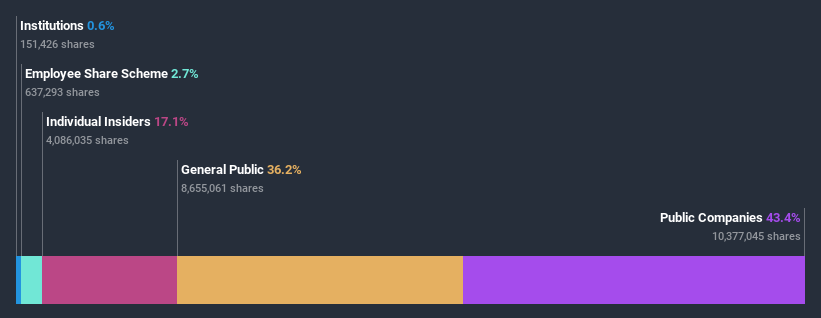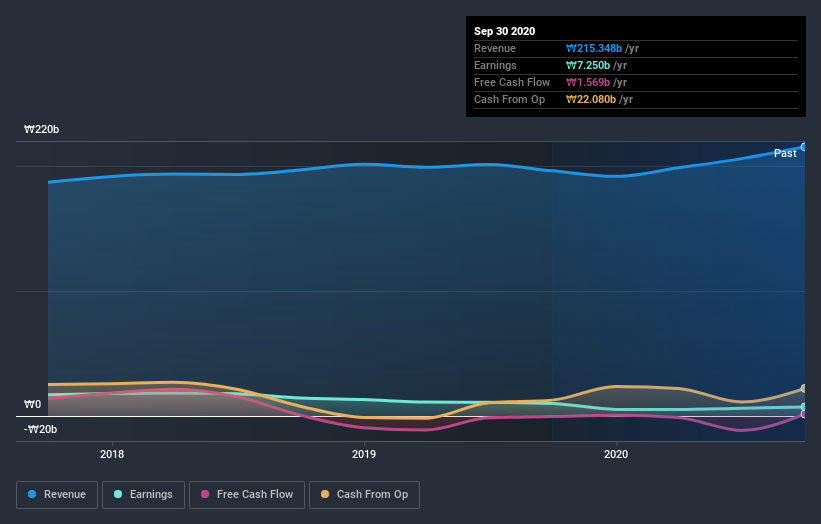- South Korea
- /
- Pharma
- /
- KOSE:A214390
What Type Of Shareholders Own The Most Number of Kyongbo Pharmaceutical Co., Ltd (KRX:214390) Shares?

The big shareholder groups in Kyongbo Pharmaceutical Co., Ltd (KRX:214390) have power over the company. Large companies usually have institutions as shareholders, and we usually see insiders owning shares in smaller companies. I quite like to see at least a little bit of insider ownership. As Charlie Munger said 'Show me the incentive and I will show you the outcome.
Kyongbo Pharmaceutical is not a large company by global standards. It has a market capitalization of ₩353b, which means it wouldn't have the attention of many institutional investors. Our analysis of the ownership of the company, below, shows that institutions are not really that prevalent on the share registry. We can zoom in on the different ownership groups, to learn more about Kyongbo Pharmaceutical.
Check out our latest analysis for Kyongbo Pharmaceutical

What Does The Lack Of Institutional Ownership Tell Us About Kyongbo Pharmaceutical?
We don't tend to see institutional investors holding stock of companies that are very risky, thinly traded, or very small. Though we do sometimes see large companies without institutions on the register, it's not particularly common.
There are multiple explanations for why institutions don't own a stock. The most common is that the company is too small relative to funds under management, so the institution does not bother to look closely at the company. On the other hand, it's always possible that professional investors are avoiding a company because they don't think it's the best place for their money. Institutional investors may not find the historic growth of the business impressive, or there might be other factors at play. You can see the past revenue performance of Kyongbo Pharmaceutical, for yourself, below.

Hedge funds don't have many shares in Kyongbo Pharmaceutical. Our data shows that Chong Kun Dang Holdings Corp. is the largest shareholder with 43% of shares outstanding. Meanwhile, the second and third largest shareholders, hold 17% and 2.7%, of the shares outstanding, respectively.
To make our study more interesting, we found that the top 2 shareholders have a majority ownership in the company, meaning that they are powerful enough to influence the decisions of the company.
While it makes sense to study institutional ownership data for a company, it also makes sense to study analyst sentiments to know which way the wind is blowing. Our information suggests that there isn't any analyst coverage of the stock, so it is probably little known.
Insider Ownership Of Kyongbo Pharmaceutical
While the precise definition of an insider can be subjective, almost everyone considers board members to be insiders. The company management answer to the board and the latter should represent the interests of shareholders. Notably, sometimes top-level managers are on the board themselves.
Insider ownership is positive when it signals leadership are thinking like the true owners of the company. However, high insider ownership can also give immense power to a small group within the company. This can be negative in some circumstances.
It seems insiders own a significant proportion of Kyongbo Pharmaceutical Co., Ltd. It has a market capitalization of just ₩353b, and insiders have ₩60b worth of shares in their own names. This may suggest that the founders still own a lot of shares. You can click here to see if they have been buying or selling.
General Public Ownership
The general public holds a 36% stake in Kyongbo Pharmaceutical. While this group can't necessarily call the shots, it can certainly have a real influence on how the company is run.
Public Company Ownership
Public companies currently own 43% of Kyongbo Pharmaceutical stock. This may be a strategic interest and the two companies may have related business interests. It could be that they have de-merged. This holding is probably worth investigating further.
Next Steps:
It's always worth thinking about the different groups who own shares in a company. But to understand Kyongbo Pharmaceutical better, we need to consider many other factors. Case in point: We've spotted 4 warning signs for Kyongbo Pharmaceutical you should be aware of, and 1 of them is a bit concerning.
Of course this may not be the best stock to buy. So take a peek at this free free list of interesting companies.
NB: Figures in this article are calculated using data from the last twelve months, which refer to the 12-month period ending on the last date of the month the financial statement is dated. This may not be consistent with full year annual report figures.
If you decide to trade Kyongbo Pharmaceutical, use the lowest-cost* platform that is rated #1 Overall by Barron’s, Interactive Brokers. Trade stocks, options, futures, forex, bonds and funds on 135 markets, all from a single integrated account. Promoted
Valuation is complex, but we're here to simplify it.
Discover if Kyongbo Pharmaceutical might be undervalued or overvalued with our detailed analysis, featuring fair value estimates, potential risks, dividends, insider trades, and its financial condition.
Access Free AnalysisThis article by Simply Wall St is general in nature. It does not constitute a recommendation to buy or sell any stock, and does not take account of your objectives, or your financial situation. We aim to bring you long-term focused analysis driven by fundamental data. Note that our analysis may not factor in the latest price-sensitive company announcements or qualitative material. Simply Wall St has no position in any stocks mentioned.
*Interactive Brokers Rated Lowest Cost Broker by StockBrokers.com Annual Online Review 2020
Have feedback on this article? Concerned about the content? Get in touch with us directly. Alternatively, email editorial-team (at) simplywallst.com.
About KOSE:A214390
Kyongbo Pharmaceutical
Manufactures and sells active pharmaceutical ingredients and finished drugs in South Korea and internationally.
Slight with imperfect balance sheet.
Market Insights
Community Narratives





